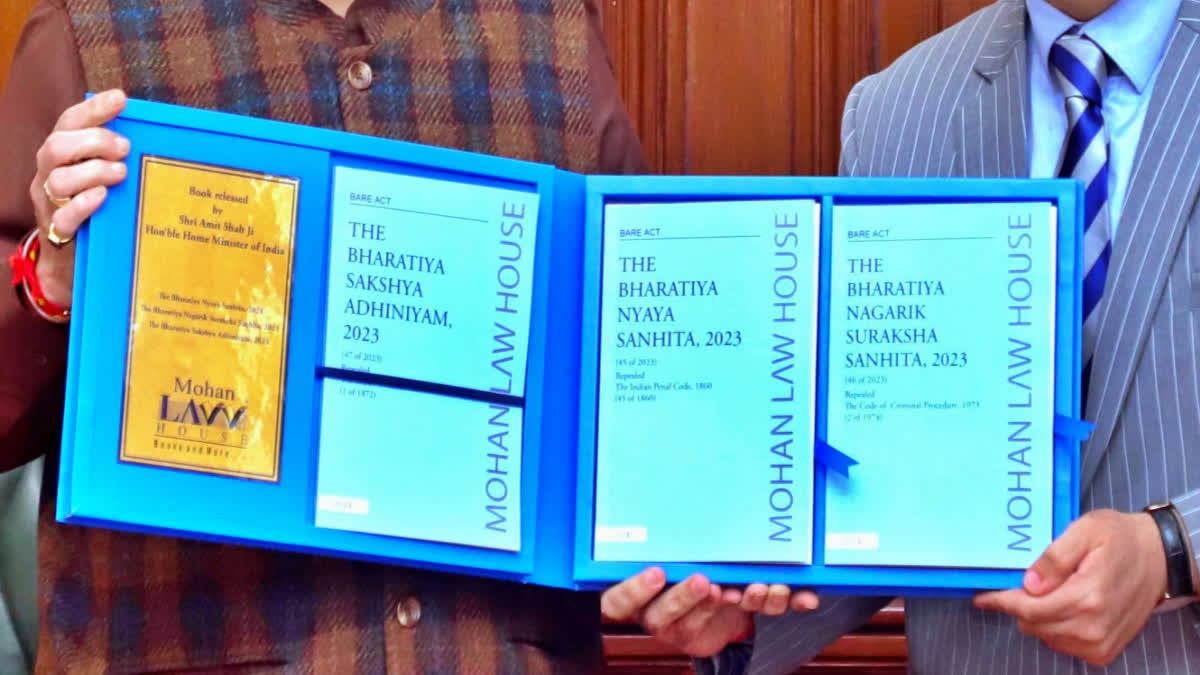Three laws relating to criminal justice administration have been brought into force from 1st July 2024. They have been the subject of discussion for quite some time; much has been written and spoken about them. I refer to the Bharatiya Nyaya Sanhita (BNS), the Bharatiya Nagarik Suraksha Sanhita (BNSS) and the Bharatiya Sakshya Adhiniyam (BSA). They have replaced the Indian Penal Code (IPC), the Code of Criminal Procedure and the Indian Evidence Act respectively.
The impact of these laws cannot be discussed in a short article. Therefore, I propose to address only a few aspects of these laws, some of which are strange, some good and some require a drastic change.
Strange
The stated intention of these laws was to get rid of the colonial mindset, but almost 90% of the BNS is a cut-and-paste job. The basic structure of the IPC could have been retained and necessary amendments made. There was no need to re-enact what continues to be a mostly colonial legislation. The BNS is nothing but old wine in a new bottle.
One of the more misused sections in the IPC was that of sedition. Youngsters were arrested for innocent tweets. Sometime back, the impression given to the Supreme Court and indeed to the country was that this colonial provision would be abrogated. But we now find that the opposite has happened. The new provision (section 152 BNS) is sedition plus. There is now greater scope for abuse of the provision, with more stringent punishment. A few days ago, some people were arrested for waving the Palestine flag. Now, they can be charged with undefined excitement to subversive activity under section 152 BNS.
Similarly, an abused section 153A of the IPC (promoting enmity between different groups) has been re-enacted and expanded as section 196 BNS. Enormous discretion continues to be given to the police to book a person for a non-bailable offence under this section. But, as in the past, it is unlikely to be used against hate-mongers.
Good
Some good provisions in the BNSS include videography in cases of search (section 185) but on a mobile phone! Hopefully, this will eliminate occasional high-handedness of the officials. But it seems there is no standard operating procedure for videography.
The law now requires mandatory display of the list of arrested persons in a police station (section 37). Good, but what happens if the arrest is not shown? The police are known to play this game. There are also restrictions on the arrest of persons aged above 60 years (section 35) in offences carrying punishment of less than 3 years. How is the age to be verified? By the way, most such offences are bailable, by and large. So this is really a cosmetic improvement.
The BNSS provides some cosmetic benefits to a victim of crime. For example, section 193 provides that in cases of sexual offences, investigation should be completed within two months. While the provision is good, if the investigation is not completed within two months, the court can be approached for extension of time. Why fix a time limit? There is also a requirement that in a case of sexual offence, the police must inform the victim of the progress in the investigation within 90 days. If information is not given, it doesn’t seem to matter. Will the police actually respect this provision? Strangely, there is no requirement to provide information after 90 days.
There are far too many gaps that make even good provisions meaningless with no compulsory follow-up.
Need for change
The BNS has introduced draconian provisions. For example, mere membership of an organization that commits a terrorist act is punishable with imprisonment for life (section 113). Therefore, a non-resident member of a well-established club may be arrested if some crackpot member of that club commits a terrorist act.
The police have been known to abuse the power of arrest with impunity. In the present times, accountability is absolutely essential. We have been witnessing weaponization of laws and the police getting away with it. Absence of accountability is a pre-independence curse, and it is continuing. The new laws have failed to provide for this. The police must be made accountable for false arrests and fake encounters.
The provision for bail is ambiguously worded (section 480 BNSS). It is possible to read it in a manner that bail cannot be granted to a person accused of murder. Moreover, the police can get custody of an accused anytime within the first 40 days of arrest, and multiple times during this period. This will clearly dissuade judges from granting bail to an accused, with the result that in some cases, imprisonment for 40 days is more or less guaranteed.
Registration of a zero FIR is now part of the law (section 173 BNSS). This practice was already prevalent, but now it has been given statutory recognition. There is no provision for immediate transfer of the FIR to the jurisdictional police station. Remember, when two women were paraded naked in Manipur, a zero FIR was registered but not transferred to the jurisdictional police station for about two weeks or so. We all know the consequences of the delay.
Several such provisions are vaguely worded, and they can invite lengthy arguments by lawyers. The burden on judges in the trial courts and the High Courts will increase. They will have to deal with some cases under the old legal regime and some under the new legal regime - not an easy task. The result - confusion everywhere and disposal of cases will plummet. Who benefits by this?
What is the solution to this problem? I am firmly of the view that accountability must be across the board, whether it is a common citizen or a senior bureaucrat or a police officer. Without equality in implementation of the laws, we will continue to be governed by two legal systems, one for those with power and the other for common citizens. If we are serious about throwing out the colonial hangover, let us begin by implementing the rule of law for everybody and not continue the washing machine syndrome in justice delivery.
(Justice Madan Lokur an Indian jurist. He is a judge of the Supreme Court of Fiji. He is a former judge of the Supreme Court of India. He served as Chief Justice of the Andhra Pradesh High Court and Gauhati High Court. He has also been a judge in the Delhi High Court.)
Disclaimer: The opinions expressed in this article are that of the writer. The facts and opinions expressed here do not reflect the views of ETV Bharat.
Read More



